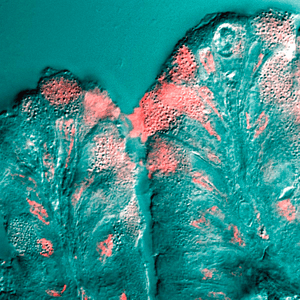Mucus facts for kids
Mucus, also called slime, is a slippery, wet substance found in many living things. Think of it like a natural lubricant or oil for the body. It helps things move smoothly and protects different parts.
Mucus is mostly made of special long chains of sugar molecules called polysaccharides. These molecules are stiff when dry but become sticky and slippery when wet. You can find mucus in all kinds of living things, from tiny bacteria to humans.
In animals with backbones (called vertebrates), mucus is made by special linings called mucous membranes. This mucus often contains helpful things like germ-fighting chemicals (enzymes) and special proteins (antibodies). A main job of mucus is to protect the body from infections caused by fungi, bacteria, and viruses.
Mucus protects the inner surfaces of many body parts. This includes the lungs, gut, and parts of the eyes and ears in mammals. It also covers the skin of amphibians and the gills of fish. Animals like snails, slugs, and hagfish also make mucus on the outside of their bodies. Besides protecting, mucus helps these animals move and even communicate.
Mucus is produced in many areas of the body. Your nose, throat, and entire alimentary canal (the path food takes) have glands that make mucus. These glands are called exocrine glands. They send the mucus through small tubes (ducts) to the body's surfaces. While most mucus is inside the body, some animals, like slugs, are covered in it.
Mucus in Your Digestive System
In your digestive system, mucus acts like a slippery coating. It helps food slide easily down your oesophagus (food pipe) and through your intestines.
A thick layer of mucus lines the inside of your stomach. This layer is super important! It protects the stomach's walls from the very strong acid that helps digest your food. Without this mucus, the acid would hurt the stomach lining. Mucus itself does not get digested as it travels through your digestive system.
You can also find a special type of mucus, called alkaline mucus, in other places. This includes your eyes, saliva (spit), and in the cervix (part of the female reproductive system). Alkaline means it's the opposite of acidic, which helps balance things out in these areas.
Images for kids
See also
 In Spanish: Moco para niños
In Spanish: Moco para niños
 | Jackie Robinson |
 | Jack Johnson |
 | Althea Gibson |
 | Arthur Ashe |
 | Muhammad Ali |



